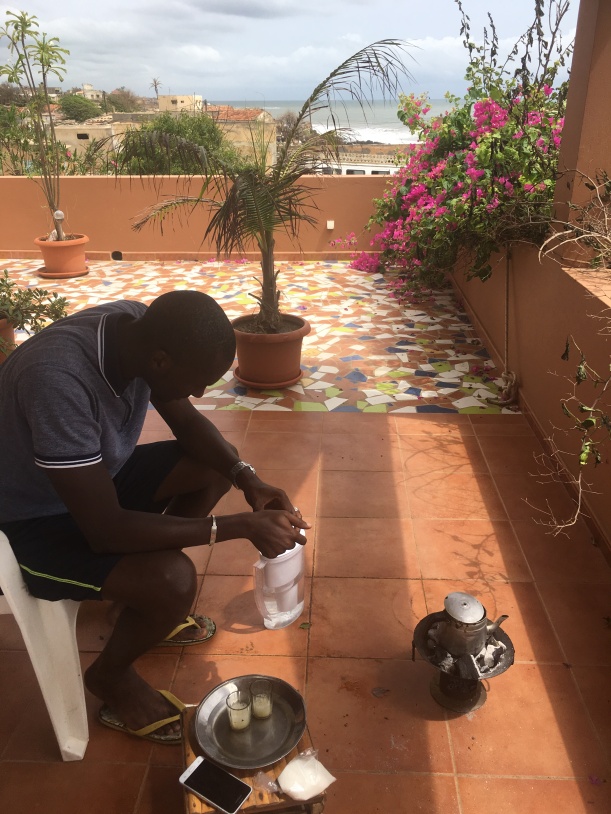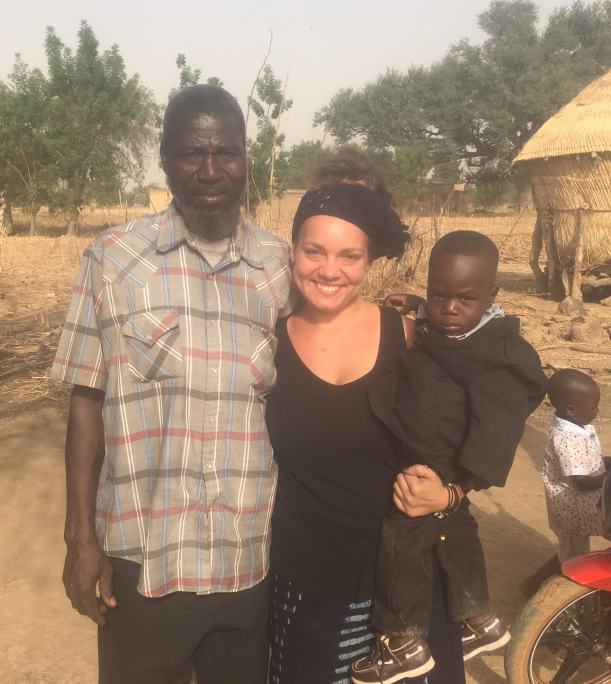
In photo: Ataaya and a view with Yama in Yène Guedj, Senegal on August 20th.
Village life:
I’ve been in Burkina for about 14 months now. The first year, overall, wasn’t too difficult: I learned the local language (Mooré) quickly, developed deep friendships, and felt accomplished in my work. I also was remarkably healthy. And happy.
The most recent 2 months have been challenging. I could name various reasons for this. One reason could be the overall vibe of the village; it’s cultivating season so people are busy in their fields all day. There’s not the normal village hustle and bustle, (by which I’m referring to a dozen people drinking under a nearby tree or the bike repair main with a line of a few broken bikes, as examples). Relatedly, the harvest is a couple months away which means now’s the time when families are running out of food and, relatedly, money. If there’s a month of hunger it’s now. Of course I’m not starving, but it affects me physically (almost no food available on market days for purchase- most of my food I transport from the city for now), and mentally, as I wrestle with the fact that people I talk to every day actually are hungry. “Hungry”: do I even know the feeling?
A couple weeks ago I made really good tacos and was so proud of them. I took one to go walk around the market area, hoping someone would ask, “Alima, what in the world is that?!” They did. I convinced a good friend (bike mechanic) to try a bite, and he did! He was better at convincing people to try it than I was, and soon the taco was gone as the men all wanted to taste and see. “What’s that?”, pointing at the tortilla shell specifically. “Uhh… bread”, I said, knowing I could rack my brain forever and not find a better Mooré word. “And that?”- lentils. “Beans”, I said. “And… that….?” – melted cheese. “Milk sauce!”. I really got creative with my language usage. Maybe such a bizarre food tasted so good because they were simply hungry!
A second reason that village life has been hard the past several weeks is I’ve been a little sick, but not in an easily explained way. I had a slight but steady fever for a week- probably longer. I had absolutely zero appetite: part of this could be due to having limited ingredients and therefore strange meals; part of this could be due to the fact that I was emotionally off, feeling isolated, unproductive, and un-useful. I recently read online that gastro-intestinal issues and mental health are closely linked. I’m not sure if this is true, but it sure seemed that way. I might have parasites of some sort, and if I do they’ll be detected next month at my medical examination.
A third reason for having a rough patch in my service could be contributed to an overall fatigue/temporary burn-out period. In the 14 months I hadn’t taken a vacation. (I have now! I’m currently in the airport in Dakar heading home after a nice 2 weeks here.) My phone service in village had gotten terrible so I wasn’t able to even call people without much effort. I knew lots of crazy things were going on in the world (attacks, American politics, etc.) but I had no news access or reliable souce of information. My main work was paused because of both the school break and cultivation period so I was home and alone and lonely a lot. On one hand I needed a rest from it all; on the other hand it felt like all I did was rest. I felt guilty.
I think this rough patch is over! As I head back to village soon, I plan to arrive refreshed and motivated. I’ll great people ethusiatically, cook appetizing meals, and start a few new projects. I’ll try to convince myself that spending a day at home reading and resting is not something that should produce guilt.
Just peace. Jamm rekk.
Senegal vacation:
“Jamm rekk” is actually not Mooré but rather it’s Wolof, the language I’ve been immersed in the past 2 weeks. My Wolof skills, which were sharp a couple years ago following a semester of intensive study in Dakar, are terribly rusty. However, a shocking number of Wolof words came back to my mind in the exact moment I needed to say them. Everything around me became a cue or a trigger, and my memory served me phrases on a platter.
The vacation was interesting. It had already been weird before leaving Burkina because I had a dramatic incident where Peace Corps required me to change my dates of my trip at what I considered to be the last minute. I felt awkward telling my host family and friends in Senegal about the switch in dates. ..they think I’m not coming at all… they think I’m crazy… they think I’m finding an excuse to wait a few more months, or years, to visit….
Not too mention my poor, confused chicken babysitter in my village who believed I hadn’t left my house even though I told her I had. (She was right- I hadn’t. Still hoping it wasn’t a ‘boy who cried wolf’ situation and she’s been feeding my chickens the past 2 weeks.)
Anyway, I was able to spend a bit of time with friends and host family members in Senegal. I also visited old beach towns I’d loved before. Being in Senegal after having lived in Burkina (and having become Burkinabè even) was interesting. I could compare the two countries on a deeper level.
Senegal felt different a little bit. Like it had changed. Or maybe I had changed? I never remembered the beach at Yène being so dirty: was it dirty last time but I had been wearing romantic, rose-colored glasses and accepted the trash as a part of an African beach?
During my vacation, I hated my 1 visit to a big market in Dakar. The sellers were touchy, pushy, loud, and impolite. Had the market atmosphere always been like this, or could it have gotten worse? Maybe it has changed, but more likely, in this situation, it was me who changed. I may have used to accept this market atmosphere as a normal west-African phenomena. But after visiting countless markets in Burkina- where sellers are totally calm and would never touch me, I felt differently, (and didn’t like), the Dakar shopping experience.
Language was different. My French has truly have taken on the accent and grammar of a Burkinabè speaker, shocking and even saddening my closest Senegalese friends. Wolof sounded different, and I was newly interested in it’s grammar and cultural elements, (for example, the Wolof system of counting money). Relationships were different too, some for the better and some for the worst. It was surprisingly easy to re-connect with my host siblings and I was more at ease with them than I’d ever been. My relationships with my two closest friends in Senegal, contrarily, were emotional and difficult for me. I wanted things to have felt the same like before, but the distance that had formed between us became suddenly evident and painful.
Anyway I know my eyes and my head and my heart has changed dramatically since study abroad a couple years ago. And I know Senegal is changing a lot too. I asked Yama, and yes.. the beach hadn’t been so dirty last time. The market, this time around, may have been extra chaotic because of the approaching holiday (Tabaski). But I knew my eyes were much more critical as well. Too critical at times, comparing too much instead of accepting Senegal as it’s own seperate entity, unlinked. Senegal and Burkina are as different as an American would find them similar.
American Ambassador to Senegal!!:
One of the best days of my academic/professional life was visiting the American Ambassador Mushingi in Dakar. I could go on and on about the day at the embassy and my conversation with him… I hope to post a seperate blog about it someday soon. You guys know how infrequent my blogging has been; no promises on “soon”…
Future plans:
I’m eager for the school year to start back up in village. I want to add soccer to my girl’s health club, meaning we would have soccer practices and games, but health topics would be woven into our meetings. (There’s a popular Peace Corps program like this.) I also hope to re-integrate, more deeply this time, into the CSPS (health center) work.
In December my parents and little sister will come visit Burkina Faso. I don’t think I’ve ever been more excited for something in my entire life. I have lots of plans for us, but mostly just sitting and talking and looking at eachother. It’s been awhile.
—
Learning Mooré: bēndga (a trap)
Learning Dioula: fey (verb ‘to have’)
Learning Wolof: niakk (word to describe someone from the “true west African bush countries” like Mali, Burkina Faso, etc. In Senegal, friends and strangers alike were hugely entertained to meet a Toubab who had become so exactly a niakk).
Learning French: casanier (a homebody)

















